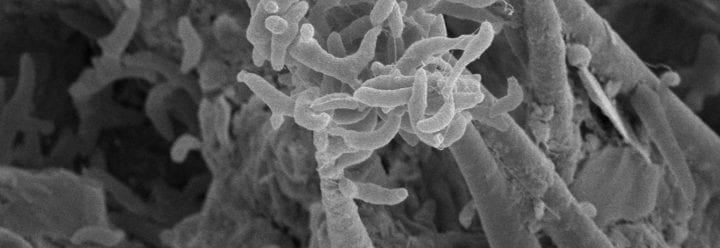M.S. Degree, Contiguous Pathway (4+1):
METX offers a fifth-year Plan I (thesis) M.S. degree pathway, earned contiguously with an appropriate Bachelor of Science (B.S.) degree at the University of California, Santa Cruz. The fifth-year M.S. pathway provides highly motivated undergraduate majors the opportunity to earn separate B.S. and M.S. degrees in five years. The pathway provides the additional level of preparation and experience that students need to pursue careers in industry, government, or to increase their competitiveness for top Ph.D. programs.
Designated Emphasis:
Master’s degree (M.A/M.S) and doctoral students from departments at UC Santa Cruz may complete a Designated Emphasis (DE) in Microbiology and Environmental Toxicology (METX) by completing two graduate courses in METX (from an approved list) and one quarter of METX 292, the weekly departmental seminar. In addition, students may have a Microbiology and Environmental Toxicology faculty member on their qualifying examination committee, and must have a Microbiology and Environmental Toxicology faculty member on their thesis reading committee, complete a significant scholarly written component on a microbiology and/or environmental health/toxicology related topic, and complete the requirements for a master’s degree or Ph.D. in their own department
M.S. Degree:
The Microbiology and Environmental Toxicology Department offers a Master of Science (M.S.) degree in Microbiology and Environmental Toxicology (METX). The METX M.S. degree can be attained through Plan I (thesis) or Plan II (capstone). Plan I:A master’s research thesis, viewed as acceptable by a thesis committee appointed by the METX graduate advisory committee, is required of each candidate. The completed thesis must be filed with the Graduate Division by the end of instruction in the term in which the candidate expects the degree to be awarded. Students will also accomplish a minimum of 40 credits of instruction. Plan II: Students complete a capstone requirement, which is an individual written project. A comprehensive project in the major subject, as approved by the METX graduate advising committee, is required of each candidate. Students will also accomplish a minimum of 40 credits of instruction.
The METX M.S. degree combines core courses and electives to provide interdisciplinary training in microbiology, toxicology, and environmental health sciences. Graduates from the program are exceptionally prepared to take research or management positions in organizations concerned with microbial and environmental health-related sciences. Graduates may also pursue fields in education or enter doctoral programs in biological and environmental health sciences or related fields.
Ph.D. graduates will demonstrate:
The Department of Microbiology and Environmental Toxicology (METX) focuses on the human and environmental health impacts of chemicals and pathogens. A unifying disciplinary theme of research in METX is that both environmental chemicals and pathogens represent physiological effects that, in many cases, elicit specific molecular and inflammatory responses that increase the risk of adverse health outcomes in exposed individuals. The METX Ph.D. program provides in-depth training in the human and environmental health impacts of chemicals and pathogens. We accomplish this goal through comprehensive coursework, extensive scientific communication training, and in-depth research culminating in a Ph.D. dissertation. Our training prepares students to become leaders in various fields, following career paths in academia, teaching, industry, and government.


